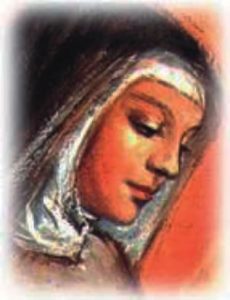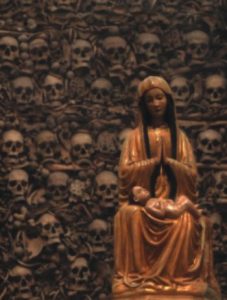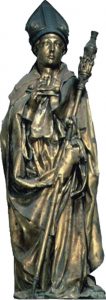August Saints
 Saint Clare of Assisi (1193-1253)
Saint Clare of Assisi (1193-1253)
Clare was a beautiful Italian noblewoman who, when she heard Saint Francis of Assisi preach, burned with a great desire to imitate Francis and to live a poor, humble life for Jesus. Running away from home, she gave herself to God. Francis cut off her hair and gave her a rough brown habit to wear, tied with a plain cord around her waist. Her parents tried in every way to make her return home, but Clare would not.
Soon her sister, Agnes joined her, as well as other young women who wanted to be brides of Jesus, and live without any money. Clare and her sisters wore no shoes, ate no meat, lived in a poor house, and kept silent most of the time. So great was her joy in serving the Lord that she once exclaimed: “They say that we are too poor, but can a heart which possesses the infinite God be truly called poor?”
Her prayers and devotion to the Eucharist saved her Sisters on more than one occasion. She suffered ill health with peace and joy till she died in 1253.
Saint Clare, obtains for us a true spirit of prayer.
(Source: http://www.catholic.org/saints/saint.php?saint_id=215)
 The Holy Martyrs of Otranto (d. 1480)
The Holy Martyrs of Otranto (d. 1480)
One of the largest groups of people to be beatified in one ceremony, the martyrs of Otranto are credited with saving Rome, with their blood and in defence of the faith, from Muslim attack. Only one of the 800, Antonio Primaldo, an elderly tailor, is known by name. The rest were unknown fishermen, craftsmen, shepherds and farmers.
At the end of July 1480, the town of Otranto in the easternmost region of Italy, was faced with the prospect of an approaching fleet carrying 18,000 soldiers. This armada was led by the pasha Ahmed, under the orders of Mohammed II who, having already conquered Constantinople, now had his sights set on Rome with the idea of turning St Peter’s basilica into a stall for his horses. Otranto was the spot on the coast most exposed to Muslim attacks.
The garrison at Otranto numbered only 400 men at arms and were offered terms of surrender, which they decisively rejected. However, during the night, many of the soldiers of the guard lowered themselves over the city walls with ropes and fled, leaving the inhabitants to defend the town. After 14 days of relentless siege, the town was taken and the Ottomans streamed into the cathedral where they decapitated the archbishop, Stefano, for defying their prohibition to speak the name of Jesus Christ.
On August 13, Ahmed asked for and obtained a list of the captured inhabitants, excluding women and boys under the age of 15. Despite the persuasions of an apostate priest and the promise that, should they abandon Christianity and become Muslims, they would be looked after and their belongings and freedom retained, 800 men, under the urging of Antonio Primaldo, refused. Primaldo exhorted them: “Until today we have fought in defence of our homeland… now it is time for us to fight to save our souls for Our Lord. And since he died on the cross for us, it is fitting that we should die for him, remaining firm and constant in the faith…” The following morning, they were led to a hill outside the city for execution.
An eyewitness to the massacre reported that “Primaldo was the first to be slaughtered and, without his head, he remained upright on his feet, nor could any of the efforts of the enemy knock him down, until all were killed. The executioner, stunned by the miracle, confessed that the Catholic faith was the true one, and insisted on becoming a Christian, and for this the pasha condemned him to death by impaling.”
Holy Martyrs of Otranto, teach us to be steadfast in our faith.
(Source: Internet – various)
 Saint Louis of Anjou (1274-1297)
Saint Louis of Anjou (1274-1297)
Saint Louis was born in Brignoles, Provence, in 1274, the son of Charles II of Naples, and was related to many saints. After being held for seven years as a hostage in Barcelona, he was ordained priest, made his profession as a Friar Minor, and was consecrated Archbishop of Toulouse. He lived to rule his see for only six months, during which time he earned the very greatest respect for his wisdom and sanctity.
Saint Louis, teach us to treasure only the things of heaven.
(Source: A New Dictionary of the Saints, Donald Attwater. 1993 Burns & Oates, Kent)
 Entries(RSS)
Entries(RSS)